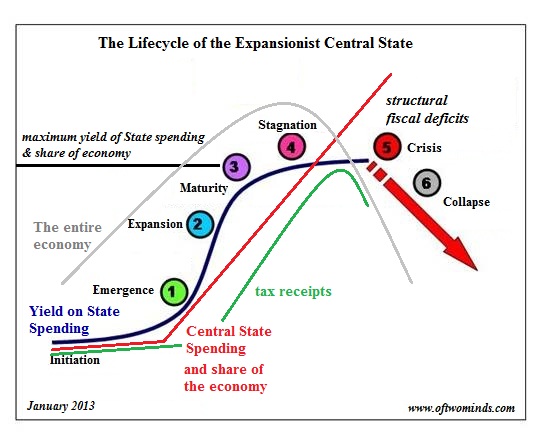What If ObamaCare, Too Big To Fail Banks and the State Are All the Wrong Sized Unit?
The State has monopolized all authority, giving it essentially unlimited power to make things worse.
The key autonomous actor in political and international affairs for the past few centuries (the nation-state) appears not just to be losing its control and integrity, but to be the wrong sort of unit to handle the newer circumstances. For some problems, it is too large to operate effectively; for others, it is too small. In consequence there are pressures for the "relocation of authority" both upward and downward, creating structures that might respond better to today's and tomorrow's forces of change.

the problem this causes is more akin to the problems of ecological 'monoculture'. That is: Monocultures are massively prone to catastrophic failures when conditions do not suit and thus require enormous amounts of inputs (including managerial expertise) than a diverse ecosystem/economy where if conditions (or management) cause some varieties to fail, there are others that will offset the losses.
My point here is the size of the unit matters only in that you can fit more small-sized units inside a given system, thereby giving it greater diversity and thus greater adaptability across a wider range of circumstances.
I guess it's like in a rainforest where when a huge and old tree collects all the sunlight up high ... then it comes down in a storm ... all the dormant seeds in the undergrowth now get a share of the light, germinate, grow ... then compete with each other for a share of the light until a single, large, old tree 'wins' and once again fills the entire space, stops the light reaching the forest floor, crushing all opposition. Well ... except the epiphytes that figure out how to attach themselves to the top of the tree and thus get a little light to live on.
In 2008 the economic big trees were in fact blown down in a storm. But some meddling fools stood them back up and tied them in place and put them on life support instead of letting them rot away on the forest floor and allowing the flush of new growth take hold. Meddlers take note: you can't fight the change that nature intends on an indefinite timeframe.
The “wrong unit size” can be carried further to the topic of "risk and risk management", with its goal of eliminating any and all risk (the Status Quo infrastructures being the massive derivatives and their insurance instruments, quantity unknown, but of suspected very poor quality).
These are concepts inherently impossible to apply with adequate results as the world is structured. The Status Quo risk management system is known to be utterly flawed and vastly leveraged/overextended as the Western monetary, fiscal and welfare spheres currently demonstrate, and the wrong size of management unit is certainly applicable. Large or small in intent or scope of action, the world has failed, as it always has, at risk management.
Things are falling apart--that is obvious. But why are they falling apart? The reasons are complex and global. Our economy and society have structural problems that cannot be solved by adding debt to debt. We are becoming poorer, not just from financial over-reach, but from fundamental forces that are not easy to identify or understand. We will cover the five core reasons why things are falling apart:
 1. Debt and financialization
1. Debt and financialization2. Crony capitalism and the elimination of accountability
3. Diminishing returns
4. Centralization
5. Technological, financial and demographic changes in our economy
Complex systems weakened by diminishing returns collapse under their own weight and are replaced by systems that are simpler, faster and affordable. If we cling to the old ways, our system will disintegrate. If we want sustainable prosperity rather than collapse, we must embrace a new model that is Decentralized, Adaptive, Transparent and Accountable (DATA).
We are not powerless. Not accepting responsibility and being powerless are two sides of the same coin: once we accept responsibility, we become powerful.
Kindle edition: $9.95 print edition: $24 on Amazon.com
To receive a 20% discount on the print edition: $19.20 (retail $24), follow the link, open a Createspace account and enter discount code SJRGPLAB. (This is the only way I can offer a discount.)
| Thank you, Marsha F. ($25), for yet another monumentally generous contribution to this site -- I am greatly honored by your steadfast support and readership. | Thank you, John R. ($5/month), for your stupendously generous re-subscription to this site --I am greatly honored by your steadfast support and readership. |



























